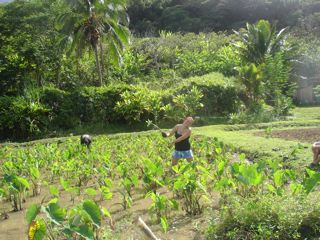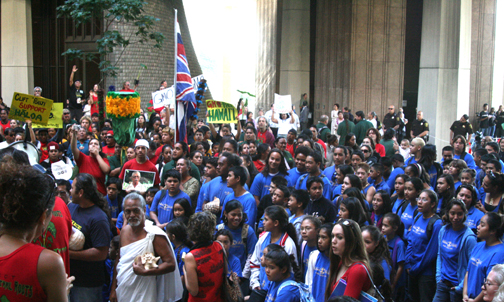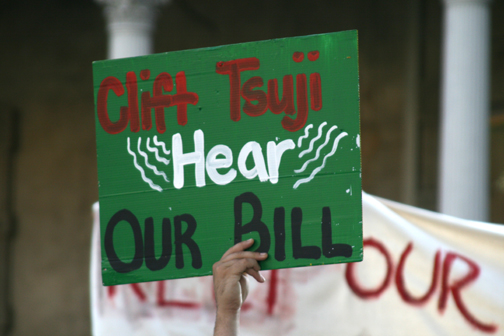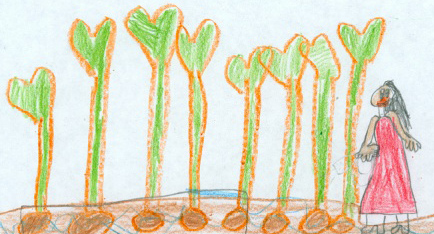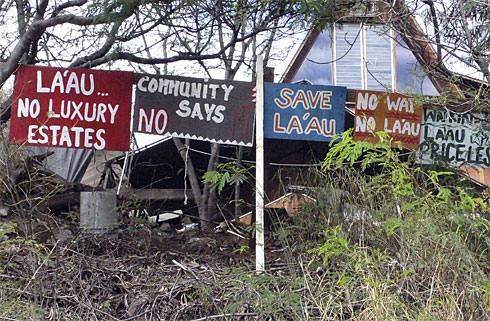Blog
News, updates, finds, stories, and tidbits from staff and community members at KAHEA. Got something to share? Email us at: kahea-alliance@hawaii.rr.com.
Contemplating the Future of Hawaii Agriculture
At staff meeting yesterday, we threw out this idea: How amazing would it be if “grown in Hawaii” was known world-wide to mean “organic and GMO free”?
As the most remote archipelago in the world–we are at the crossroads of the future of agriculture. We can either choose to become a haven for pure, high-quality, high-value organic and GMO-free food, or an isolated testing ground for corporate biotech to try out their genetically modified pharmaceutical and mcfood crops. What’s it going to be?
To remain silent on this issue, is the same thing as choosing. Unless we raise our hand to say “NO”, the future for Hawaii IS unrestricted, unmitigated, unlimited biotech. From last year’s Star Bulletin:
Pineapple will give way to biotech seed crops in Kunia as Monsanto Co. expands its acreage in the state by purchasing lands once tended by Del Monte Fresh Produce Hawaii.
Monsanto has entered an agreement to acquire 2,300 acres of agriculture-zoned land from the James Campbell Co.
See full article at: http://starbulletin.com/2007/04/05/news/story02.html
Spreading the Word
Video posted by ViralKauai already has over 800 views by our count. You can support SB958–Learn more and hear the call to action. Send in your testimony, attend the hearing. Spread the word.
“If we get a hearing, then all of you need to come back again to that building. It’s not a one-shot deal. We need to come back again to that building when they vote in the committee!”
WEDNESDAY MARCH 19th, 8:30 am, till about 12:30
(Last committee hearing for this bill, House Agricultural Committee.)
Learn more and submit testimony at: www.kahea.org/gmo
Kalo Farmers' Call to Action - Hearing for SB958
From our friends at Na Kahu O Haloa: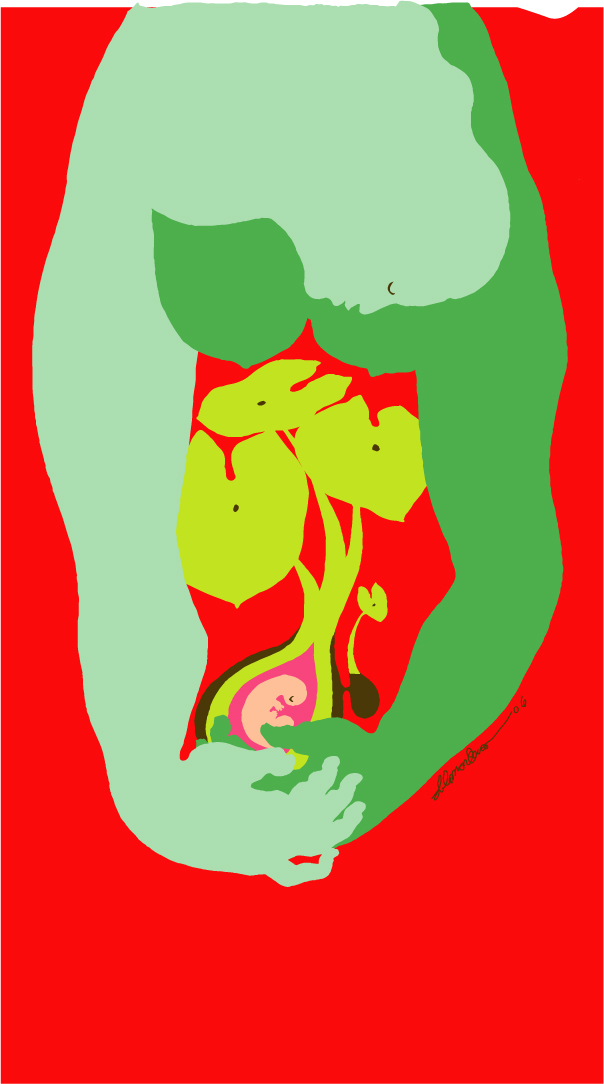
Aloha to all who love Taro and honor Haloa! He keiki aloha na mea kanu. Beloved children are the plants.
Mahalo to everyone who has come out to support Hawai‘i’s traditional farmers! Your strong support & efforts scored a Hearing for SB958 – 10 Year Moratorium on Genetically Modified & Patented Taro! Mahalo piha!
WEDNESDAY MARCH 19th, 8:30 am, till about 12:30
This is the last committee hearing for this bill, House Agricultural Committee. (If it passes unamended it will then go to the House floor for the 3rd reading.)
Come support kalo at this historic event, your presence is Haloa’s blessing! Please spread the word! That day is also Hawaiian Caucus Day at the Capitol, hosted by Rep. Mele Carroll, from 10am-4pm- featuring a variety of cultural activities, speakers and performances.*
In the meantime we all have the hard work of convincing the politicians to PASS the bill without inappropriate changes. Hawai‘i’s farmers, our unique ecosystem… and Haloa need your help to make this happen. So, please take a few moments to:
SEND YOUR LETTER OF TESTIMONY! write now!
Let there be no doubt that Hawaii wants to protect kalo from genetic modification! We have gotten lots of statements of support from taro farmers throughout the islands, but the decision-makers need to hear from all of us. Don’t be shy, every letter is important!
*TESTIMONY LETTERS NEEDED BY Thursday, MARCH 13th!*
Four Easy Ways to Submit Testimony:
(1) email it to: *NaKahuOHaloa@gmail.com** And if can, use your *letterhead* and attach it to the email as a PDF or doc.
A “two-fer”: When emailing your letter, you can also send it as a letter to the editor, by copying these emails into the “CC” address line when you send us your letter:
letters@honoluluadvertiser.com
letters@starbulletin.com
(2) visit www.KAHEA.org/gmo to submit testimony via our virtual testimony table.
(3) mail your testimony to KAHEA (Attn: Kalo) at
P.O. Box 270112
Honolulu, Hawaii 96827
(4) Fax it to: 1-888-528-6288 (yes, thats 888 not 808 – it’s toll free!!)
VOLUNTEERS
We need volunteers of all ages during these days leading up to the hearing! There are many ways to help Haloa. Formal volunteer internships may be available too! Please contact us if interested! NaKahuOHaloa@gmail.com.
CRUCIAL CALLS TO ELECTED OFFICIALS
Polite persistent phone calls are CRUCIAL to get support of politicians! Please call/fax/email the House Agricultural Committee and ask for support of SB958- a 10 Year Moratorium on Genetic Modification of all varieties of Taro.
Attached is a print out of Ag Committee phone numbers & talking points to pass out to everyone you know. Calls can be repeated everyday, polite persistence pays!
EDUCATIONAL MATERIALS & SPEAKERS
We have a wide variety of educational materials, including films, available to any who are interested. Expert speakers will also volunteer to visit your group to discuss this issue. Contact NaKahuOHaloa@gmail.com.
We hope these resources may be of help to you. Let us know how else we can help you and your community to speak up for Haloa!
planting and empowering
From Bryna + Marti:
At the start of the 2008 legislative session, more than 500 people joined Na Kahu o Haloa and Hawai’i's traditional farmers at a three-day camp across from the State Capitol, on the grounds of ‘Iolani Palace. There they gathered to learn and educate others about taro, the traditional food and ancestor of the Hawaiian people–HALOA the KALO–and call for an end to genetic modification and patenting of this Hawaiian resource. (*note: for non-speakers, taro is the english word for kalo.)
This year, traditional farmers from all over the islands are calling upon the Hawaii state government to enact a law that would place a 10-year moratorium on the genetic modification and patenting of kalo (taro).
Genetically modified kalo can cross-pollinate with native kalo varieties and the unknown longterm and potentially dangerous effects to the species, our environment and our local agriculture business can be irreversibly permanent. There is no complete research to understand what long term threats to human health may come from eating genetically modified kalo. Genetic modification is an imprecise and short-sighted attempt at a solution to stresses that Hawaiian kalo agriculture faces when clean abundant water is no longer made available to farms. Hawaiians have been successfully breeding and farming many varieties of kalo for thousands of years- time & experience have proven that species diversity & access to clean water is what is needed for a sustainable agriculture industry that can feed our islands.
Genetically modifying and patenting kalo is also culturally inappropriate because kalo is both a fundamental and sacred food source to Hawaiians, who understand that their shared ancestry began with Haloa the Kalo. Haloa the Kalo was the first kalo plant born from the ancient gods and became food for his younger brother, Haloa the Human- child of the same gods and the first human ancestor of Hawaiians. Haloa the Human was given the kuleana (responsibility) to take care of his older brother, Haloa the Kalo, who would in turn provide food for all humans. It must be understood: Kalo is not only a staple food source for people in Hawai’i, Kalo is also a member of our family, Kalo is our Kupuna!
Since those amazing three-days in January, I have had the privilege to work with amazing farmers and community members from all around the islands. I have collected and read hundreds of letters of testimony in support of protecting kalo (taro) in Hawaii. Each time I read the words being offered, I have to take a moment for appreciate their makana for Haloa. It has been so heartwarming to see so many coming forward with such labors of pure love.
Despite heavy pressure from the USA, Genetically Modified food is widely rejected in Japan & Europe. Many areas have made GMOs illegal, as they have come to understand the environmental & economic threats that GMOs pose to traditional foods & agricultural sustainability, as well as human health. Hawai’i can be a world leader–embracing appropriate agricultural research & pono policy that sustains healthy islands, culture, as well as productive participation in the international agricultural community.
(Photo Credits: Photo 1 – Trevor Atkins, Photo 2 – Trevor Atkins, Photo 3 – drawing by Mackenzie (2nd grade)).
200 Luxury Estates a good thing for Molokai?
From Marion:
Last week, KAHEA submitted written testimony to the State Land Use Commission in opposition to “the proposal by Molokai Properties Limited to build 200 luxury estates at La’au Point” which will negatively impact the environment and culture.
Our comments point out that: although there is overwhelming scientific evidence supporting that the main Hawaiian Islands serve as foraging and breeding grounds for monk seals and millions of dollars for research and monitoring have been set aside, little has been done by the state and federal governments to permanently protect habitat — like that La’au point. The truth is that the single most important action we can take to save monk seals is provide them places of permanent pu`uhonua, true and forever sanctuaries. Monk seals survive best when left alone in a place where humans do not dominate the landscape, in sanctuaries marked only by the presence of blowing sands and waves crashing against jagged lava formations at the water’s edge.
Further, because “Molokai is one of a few communities that still have resources to sustain traditional subsistence”, they need to be honored and protected to ensure the perpetuation of these traditional practices of gathering for their families and communities. The reason why these practices still remain today have to do primarily with the fact this shoreline is undeveloped and difficult to access.
The proposed development will limit access to this 5-mile stretch of coastline by providing only two points of entry, one at each end of the proposed coastline development even though the “state law requires that public access to the shoreline be available every quarter mile” which is clearly not honored in this proposal.
The Molokai community has voiced their undying concern regarding the relentless and greedy development plans of Molokai Properties Limited. The community has no interest in having a community split and culturally and socially restricted by the influx of big money. Today, they are standing up, protecting their inherent rights to collect what they need from the mountains to the oceans that keeps their culture alive.
To make this place no more than a picture postcard tropical beach destination is to strip it of its most fundamental and uniquely Hawaiian identity. We stand together with communities on Molokai to share the view that the sea, land, culture, and people remain vital in marking this land as a Hawaiian place.
Click here to read comments on the EIS:
KAHEA’s comments in opposition to the development at La’au Point
Office of Hawaiian Affairs’ Comments on the development La’au Point
Living Language
No ke aha e kupaianaha ai ka ‘olelo Hawai’i ma Hawai’i nei? Why is the Hawaiian languauge a strange language in Hawai’i nei?
Each place in our islands has a Hawaiian name and is associated with mo’olelo or an ancient Hawaiian story. Still, the Hawaiian language with its history, insights, and cultural significance remains silenced in its ‘one hanau or birthplace.
The collection of ‘olelo no’eau or Hawaiian proverbs provide some evidence that the Hawaiian language evolved and emerged as they discovered and wandered the beautiful landscapes of this new and unfamiliar land.
The steep cliffs of the Ko’olau mountains and high sea cliffs of Moloka’i provided one example for an avenue of poetic thought and expression that were used to compare and contrast plants, animals, and people to its sheerness and distinction.
Over the next few months, we hope you will see more more Hawaiian language in KAHEA’s outreach and website–part of a renewed commitment from us to integrate the Hawaiian language as a living part of our daily work.
We’ve seen some other hopeful examples around, including the recent release by GO! Airlines of their bilingual website. So maybe GO! Airlines pilots *have* been snoozing behind closed doors… but the company has invested in an effort to provide their Hawaiian language speaking customers a choice to make their reservations in ‘olelo Hawai’i.
Let’s all be a vehicle to support the Hawaiian language in the capacity we can as individuals, communities, and organizations. E ola ka ‘olelo Hawai’i!
our world gets bigger.
UPDATE from Rich on 2/29: Got word yesterday that the House Finance Committee passed HB839 with amendments!

From email from Rich ma over at Beach Access Hawai’i in Kailua:
I was going to use a clever subject line for this email — something like, “Show me the money!” because that’s what it comes down to now. We’re asking the State to pony up bucks to do this beach access survey and report. But a little earlier I got a phone call from someone in our group…
His mother passed away this morning and he wanted the phone number of another BAH member, because he needed help getting a canoe so he could scatter her ashes in the waters off the Mokulua islands. He said she loved Lanikai and Kailua Beach, and this is what she wanted.
Until I got involved with this cause, I didn’t know him or the paddler he wanted to get in touch with. I think it speaks volumes about what the beaches and ocean means to all who live in Hawaii. It connects us, and brings us together. You know those people who put up gates on “private” roads? Their world has gotten smaller, while our circle of friends is growing and getting bigger.
You can support the bill he’s talking about–HB839– by showing up to the hearing and/or emailing in your testimony to the finance committee. FINtestimony@Capitol.hawaii.gov (contact Rich at figeli001@hawaii.rr.com if you need sample testimony to follow.)
From BAH: The meeting will be in Room 308 at the State Capitol building. HB839 is at the top of the agenda, so testimony will probably start around 11:15 am, and could continue for a half hour to an hour depending on how many people show up.

